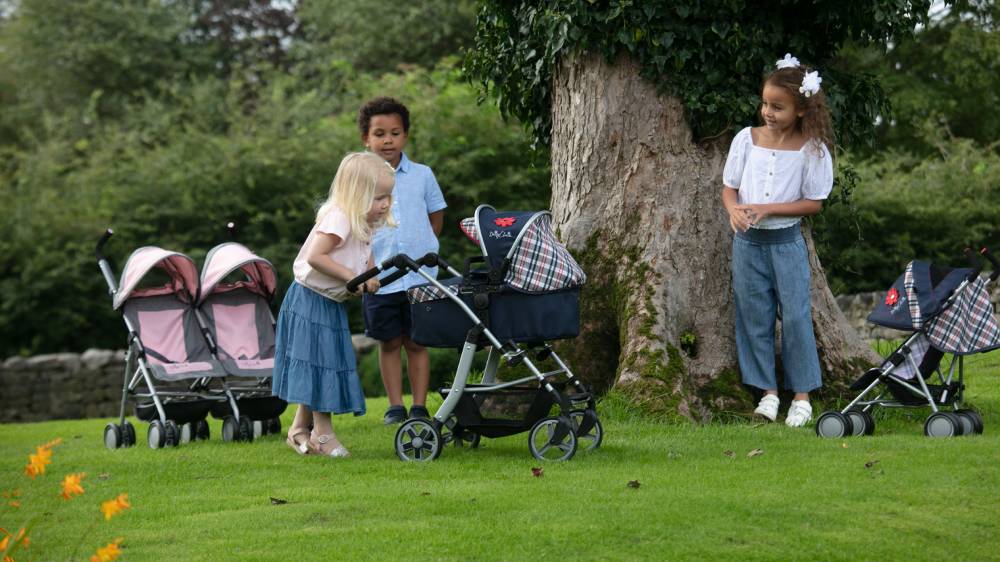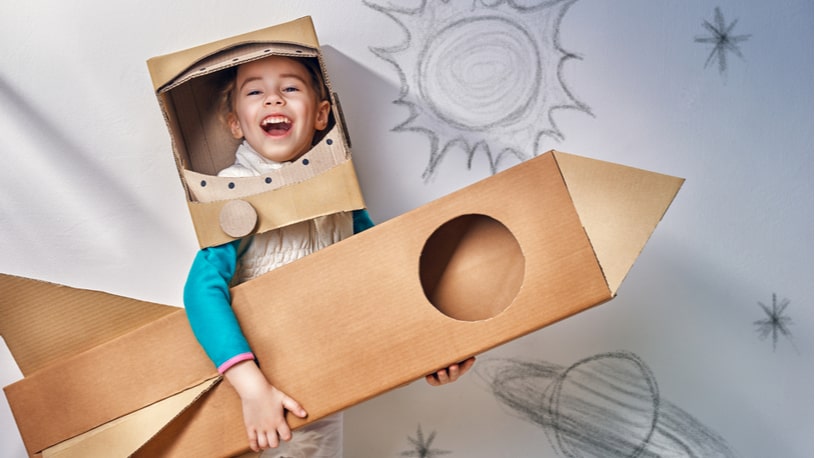Your child’s mind is bursting with imagination; from initiating play with themselves to involving other people in their playtime, it’s constantly creating new worlds and stories – and who wouldn’t want to encourage that?
There are so many benefits of imaginative play, and we’d love to encourage more parents to get involved and promote imaginary play with their little ones! Here’s our guide to the benefits of imaginative play and how you can encourage your children to use their creative thoughts.
What is imaginative play?
You may be thinking, what is imaginative play? To understand how imaginative play can help our little ones develop creative minds, it’s essential to understand what makes up an imaginative play session.
Imaginative play is when a child takes on a role during playtime. This could be anything from pretending to be a parent, a doctor, a firefighter, an alien – anything they want to be. They’ll pretend play and act as if they are that character, interacting and making decisions in their role, experiencing positive and negative feelings along the way.
It may seem like a simple imaginary play session to us, but there are many developmental reasons why we should be encouraging them to delve deeper into imaginative play more often.
Why is imaginative play important?
Imaginative play gives children the opportunity to learn practical life skills, such as dressing themselves, how to cooperate and share with others and problem-solving skills, which will be formative to them growing up.
Children learn from experience, what happens around them, and what they see, hear, smell, taste and touch. Experimenting with role-playing and make-believe allows children to develop their decision-making skills and absorb those experiences to make sense of the world.
What are the benefits of imaginative play?
So why should we introduce imaginative play and get our children to explore the concept more? The main reason is simple – pretend play is a pivotal component of normal child development and helps their brains develop core skills they will use in their everyday lives.
Creativity
The most obvious benefit to playing make-believe is that it helps build up their imagination. When playing in a made-up world as someone that they’re not, they’re using their creative imagination to determine how the ‘story’ goes, as well as how their ‘character’ would react.
But these reactions are often built on observations of how we – as adults – react to similar, real-life situations. Essentially, they have the freedom to be whoever they want when engaging in pretend play!
Develop social skills and emotional development
While it may not seem like a complex psychological task, being able to roleplay and take on a different character’s personality helps them develop their social skills. It allows them to explore their decision-making skills, as well as encourages them to develop their problem-solving skills and explore different solutions using their imagination.
Children learn from their surroundings and rely greatly on watching how adults around them respond to situations. With imaginative play, children often take on ‘adult’ roles, such as parents or authority figures to re-enact responses they have learnt.
It’s a vital part of child development to practice these skills, especially as it works on their understanding of how to act in situations and interpretation skills.
It also benefits their emotional development. While you shouldn’t expect Oscar-worthy dramatic performances from your little one, you will notice that they start introducing their emotions into imaginative playtime. This is a sign that they are improving their emotional development and reacting with the appropriate emotional response.
Develop communication skills
Language skills are also improved when playing make-believe, as they will need to be able to express themselves to others that they are playing with through communication.
Verbally communicating with others when pretend playing allows your child to explore new vocabulary they may have picked up when observing similar situations in the real world and develop their language skills.
Imaginative play also helps them expand their knowledge of using body language as a form of communication. This can range from knowing when to smile to showing confidence with their posture.
Helps children understand the adult world
No matter the pretend play your child engages in, they will gain a greater understanding of the adult world around them. This will provide them with a point of reference for learning and developing in the world as they grow.
Engaging in pretend play of everyday life situations, such as different job roles or household chores, lets your child experience adult world activities and encourage them to join in with you day to day.
How to encourage imaginative play
Many children will start to explore their imagination during playtime naturally, but there’s no harm in encouraging your little ones to engage in it more often.
Give your children a reason to start pretend play – build a den, turn a room into a doctor’s office, encourage them to use their imagination and see everyday objects as something they can use in their playtime. If you have an area specifically dedicated to imaginative play, your children will be more likely to engage.
It’s also essential that you expose your children to new experiences so that they can learn how to deal with them and re-enact them during play. Take them to the supermarket and let them observe you as you shop, go for a walk with the dog around the park, take a trip to the zoo – give them opportunities to learn about new situations and how to respond, and you’ll start to see them popping up during their play sessions!
Props are also important – but you don’t have to go out and buy brand new items just for imaginative playtime! You can use everyday objects from around your home and guide (or let your child decide) as to what they could potentially be used for.
Cardboard boxes can be anything you want them to be, and cushions can make great steering wheels – you get the idea! If you have props around your home that fit perfectly with your child’s story, don’t be afraid to get them out and use them! Dolls prams and pushchairs are perfect for family roleplays – and you can be sure that teddy or dolly will be super comfy, too!
Getting involved with your child during imaginative play and taking on your own role within their story is massively beneficial to both you and your child. Having someone to interact with allows your child to react in a way in which they see fit within their made-up world, as well as forming an essential part of your child’s development. It also helps build on your relationship with your child – who doesn’t feel a sense of pride when you see just how well your little one reacts to situations during play?
So, eat that piece of invisible cake, pretend to be the dog, and show interest in what your child is actually creating in their own little world – they’ll love that they can play with mum, dad or grandparents and they’ll be unknowingly improving some essential life skills, too!
Examples of imaginative play
Whether you’ve been coming up with imaginative play ideas for years or are new to exploring pretend play with your kids, you’ll find some inspiration below for some really easy and fun ideas to get your little one’s imagination flowing!
Don’t forget, using toys your child already owns and a cardboard box can be enough of a play space for your kids to come up with hundreds of role play ideas that will keep them entertained for hours.
Playing like Mum & Dad

If your kids have toy dolls, why not pair them with their very own dolls pram so they can role-play being parents to their interactive dolls. No matter your child’s age, playing house is a fun way for your kids to act out their own little family and really feel involved with the family unit.
Playing doctors and nurses

Another favourite idea is letting your kids play doctors and nurses where you can act out being the patient and they can ‘diagnose’ you with imaginary illnesses or problems.
There are a variety of toys or everyday items around the house that can act as medical equipment, the kitchen apron can act as a uniform, or a duster could work as bandages, meaning you can easily create a doctor’s office in no time!
Job-based role play

Engaging in public-facing roles is great for child development as it encourages discipline and empathy and helps children to understand and express their feelings through the re-enactment of certain experiences.
Being a superhero

Take an old cardboard box, toys and stuffed animals and build a city that is under attack by an evil group of toys and let your kids save the day! This play scenario is ideal for imaginary and active play in your house or outdoors as it takes advantage of the variety of environments at your doorstep.
Pretend travel

Get even more creative with your ideas for your kids and create imaginary travel adventures for them to go on. Taking imaginative outdoors is a great way to get kids and young children away from screens and into the fresh air and is such a healthy contributor to their child development.
There are so many options when it comes to pretend travel; your kids will never get tired of going on wacky adventures with you. Go on a safari holiday, explore a jungle, or act out deep-sea diving for treasure – these are just some ideas that children are sure to love.
See the benefits of imaginative play with a dolls pram
Here at Play Like Mum, we have an exclusive range of Daisy Chain dolls prams and pushchairs that are the perfect addition to any imaginative play session.
There are dolls prams for everyone, ranging from dolls carriage prams to twin dolls strollers, and even dolls pram accessories to match your child’s favourite pram.
For more ideas on how to keep your little one’s entertained and learn key life skills along the way, take a look at some of our other guides:
- 12 Fun Craft Ideas For Kids With Paper
- Fun Games and Things to Do With Kids During the Easter Holidays
- How to Make Baby Doll Clothes for Your Interactive Baby Doll
- How to Make a Dolls Pram Quilt
- What You Can Do With the Susie Interactive Doll
- 10 Role Play Ideas for Kids
- 7 Outdoor Garden Games For Kids To Enjoy
- How to Encourage Imaginative Play in Children & Grandchildren

